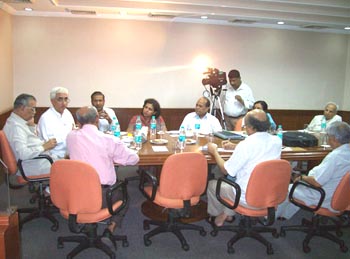Salman Khursheed interacts with Monitoring Committee (July 17, 2009)
New Delhi, July 17: The Equal Opportunity Commission (EOC), details of which are being finetuned at present, to be finally established through an Act of Parliament, epitomises the second wave of empowerment of Indians.
Minorities Affairs Minister Salman Khursheed said this last evening at a programme organised to felicitate him. The programme was jointly organised by the Institute of Objective Studies (IOS) and Monitoring Committee for People’s Rights (MCFPR).
Khursheed said the “first generation of empowerment measures included reservation.” The Equal Opportunity Commission on the anvil would accommodate “new aspirations of Indians” for a more equitable and just order.
The commission would not be narrowly focussed on castes and classes like the “first generation empowerment” did. It would seek to enhance access to the country’s resources and a better quality of life for all Indians, across the board, without being limited by considerations of caste, gender or class. In that sense it is “aspirational” in nature.
The commission’s sweeping jurisdiction makes it overlap at certain points the authority of quite a few other commission like the Minorities Commission and Human Rights Commission. There is a lot of fine-tuning going on to avoid such overlaps. More details would be worked out when the draft reaches the Select Committee.

Khursheed said he was looking forward to receiving inputs from civil society organisations like IOS and MCFPR. He explained that it was mere coincidence that the Minorities Affairs Ministry had got the job of a midwife in the birth of the EOC. The commission’s area of relevance touches “at least 10 minorities, and I would not mind if it goes to some other ministry once the EOC is born”, he said. “I would not mind if it succeeds and the Minorities Ministry closes down”.
Khursheed was upbeat about the extraordinary promise of the EOC. Former Chief Justice of India Justice AM Ahmadi, who is also the chairperson of the Monitoring Committee for People’s Rights, observed that the commission would be often found in the “role of a litigant before the courts”.
People who would be denied the right to equal opportunity would go to the commission, which in turn would move the courts. That would require judges to be sensitive to the issues involved.
Economist Abusaleh Shariff said his field research regarding the preparation of the Sachar Committee Report showed that a subliminal, unintentional bias was entrenched in the day-to-day working of bureaucracy. That was one of the contributory factors behind the high level of Muslim deprivation. The institutions that were charged with the uplift of minorities had failed to do their job. Hence the need for the EOC.
Shariff, who has extensive experience in the field, said that to reach the ultimate beneficiaries, funds meant for the uplift had to pass through state governments, which allocated those funds to different departments, which in turn went to government functionaries and local self administration bodies. That was always likely to allow a lot of seepage along the way. He advocated direct funding, bypassing a lot of intermediaries.
Bhasha Singh, political editor of Nayi Duniya, woundered whether the EOC would be able to plug the loopholes created by bureaucracy, which tend to defeat the best programmes. MCPR member Doel Mukherjee, who is a consultant on police reforms, wondered whether practices like putting up “fair bride” advertisements in newspapers could be stopped.
Khursheed said that in a democracy nobody could be penalised merely for desiring to have a fair bride, or for trying to have one, but there could certainly be a ban on such advertising that promotes discrimination against brides that were not fair enough.
Representatives from the IOS wondered whether the EOC’s writ would be enforceable. Dr. Ishtiyaque Danish of Jamia Hamdard and Prof. M. Ishtiaq of Jamia Millia were in favour of some mechanism that created more educational institutions in areas with substantial Muslim population.
Dr Manzoor Alam, as the chairman of the IOS and as member secretary of MCFPR, offered unconditional support to the Minorities Affairs Ministry and the EOC in their work. He added that the IOS had mooted the establishment of a Minorities Affairs Ministry in a letter to the UPA chief. “However, it is not the ministry that we had envisaged”, he added. Minister Salman Khursheed said he would keep in touch and expect regular inputs from the IOS and MCFPR.
Go Back